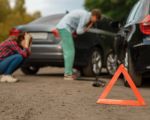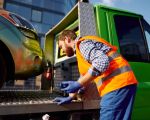1. Introduction: Understanding Bicycle and Car Accidents
Accidents involving cars and bicycles are unfortunately common, and they can lead to serious consequences. When a car collides with a bicycle, the results can be devastating for the cyclist, who is unprotected and vulnerable. In the U.S., there are thousands of bike-car accidents each year, and knowing how to handle such situations can make a huge difference in the outcome.
If you are involved in a car accident with a bicycle, it’s important to stay calm and follow specific steps to ensure everyone’s safety, manage the situation correctly, and protect your legal rights. Whether you are the driver or the cyclist, understanding the appropriate steps can help minimize the damage and ensure proper handling of the accident. In this article, we will go over how to handle a car accident involving a bicycle and provide actionable advice on what to do immediately after the incident, including safety precautions, legal considerations, and steps for recovery.

Gerber Collision & Glass
25180 Novi Rd, Novi, MI 48375, USA
2. Immediate Steps to Take After a Car Hits a Bicycle
When you are involved in a car-bicycle accident, the first priority is ensuring the safety and well-being of everyone involved. Here are the immediate steps you should take after such an accident:

Gerber Collision & Glass
25180 Novi Rd, Novi, MI 48375, USA
2.1. Ensure Safety and Check for Injuries
The very first thing you should do after any accident is to ensure that everyone is safe. If you're the driver, stop your vehicle immediately and check on the cyclist. Make sure the area is secure, especially if you're on a busy road. If the cyclist is injured, do not attempt to move them unless they are in immediate danger (such as from traffic). Call for medical help right away.
As the cyclist, if you're able to do so, move yourself out of the traffic flow to avoid further risk. If you’re unable to move, remain still and try to stay calm until help arrives. Always assume that a serious injury could have occurred, even if there’s no visible sign of injury.
2.2. Call Emergency Services
Regardless of the severity of the accident, you should always call emergency services (911) after a bike-car collision. The police will help document the incident and ensure that medical help is on the way for anyone who’s injured. An official police report will be crucial if you need to file an insurance claim or pursue legal action.
Even if the accident seems minor, a report is essential for accurate documentation. Police officers will assess the situation and gather the necessary details from all parties involved, including witness statements. Be sure to provide truthful and accurate information to the officers.
2.3. Exchange Information with All Parties Involved
Just like in any car accident, it’s important to exchange contact and insurance information. This includes names, phone numbers, license plate numbers, and insurance policy details. If possible, take photos of the scene, the vehicles involved, and any visible damage or injuries. These photographs can be used as evidence if needed for insurance claims or legal purposes.
For cyclists, having a helmet cam can be invaluable. If you’re able to capture any footage of the accident, it may help provide additional context for how the collision occurred.
3. Legal Considerations After a Bicycle-Car Collision
Dealing with the legal aspects of a car-bicycle accident is just as important as addressing immediate health and safety concerns. Here’s what you need to consider:
3.1. Understanding Liability
In car-bicycle accidents, liability can be complex. Both the driver and the cyclist have responsibilities when it comes to following traffic laws and ensuring safety. For example, a driver may be at fault if they were speeding, distracted, or failed to yield to the cyclist. Similarly, the cyclist may be at fault if they were not following traffic rules or riding in an unsafe manner.
It’s important to have a clear understanding of who was at fault in the accident. A police report and witness statements will help determine liability. In some cases, both parties may share fault, and this will be taken into account in legal or insurance proceedings.
3.2. Filing an Insurance Claim
If you were the driver, your car insurance policy will likely cover the damages to the cyclist’s property or any medical expenses, depending on the coverage. If you are the cyclist, your personal health insurance might cover your injuries, though you may also be able to file a claim against the driver’s insurance if the driver is found to be at fault.
If the accident caused significant damage or injuries, it’s important to consult with an attorney to understand your rights and options. An attorney specializing in personal injury or traffic law can guide you through the process and ensure you receive appropriate compensation for medical bills, lost wages, and other damages.
4. Addressing Injuries: Medical Help and Recovery
Whether you’re the driver or the cyclist, dealing with injuries after a bike-car collision should be a top priority. The physical impact of an accident can vary widely depending on the speed of the vehicles involved and the nature of the collision.
4.1. Seeking Immediate Medical Attention
Even if injuries seem minor, it's important to seek medical attention after a bike-car accident. Adrenaline can mask pain, and some injuries may not be immediately apparent, such as concussions, fractures, or internal injuries. Visit the hospital or see a doctor to ensure that you receive a thorough evaluation.
If you're the cyclist, you may be more vulnerable to severe injuries. Wear a helmet to reduce the risk of head trauma, and follow your doctor’s instructions for recovery. In some cases, physical therapy or surgery may be required depending on the extent of the injuries.
4.2. Long-Term Recovery and Rehabilitation
Depending on the severity of the accident, recovery may take weeks or even months. It's important to follow the prescribed recovery plan, attend follow-up appointments, and focus on rehabilitation to regain full mobility. If the accident resulted in long-term disability, you may be entitled to compensation for lost wages and medical expenses.
5. Tips for Preventing Future Bicycle Accidents
While accidents can happen unexpectedly, there are steps both drivers and cyclists can take to reduce the risk of collisions. Here are some tips to help prevent future bicycle-car accidents:
5.1. For Drivers
Always be aware of cyclists on the road, especially in areas with heavy bike traffic. Yield to cyclists at intersections, and be sure to check your mirrors and blind spots before making turns. Avoid distractions like texting or using your phone while driving, and obey speed limits, particularly in residential areas or near bike lanes.
5.2. For Cyclists
Cyclists should always wear helmets and visible clothing, particularly at night. Be sure to follow traffic laws and signals, use bike lanes where available, and make sure your bike is equipped with proper lighting and reflectors. Ride defensively, and always be prepared for potential hazards like drivers failing to yield.
6. Conclusion: Navigating the Aftermath of a Bike-Car Accident
Handling a car accident involving a bicycle requires careful attention to safety, legal considerations, and proper documentation. Whether you’re a driver or a cyclist, following the right steps after an accident can help ensure that everyone involved receives the necessary help and compensation. Always prioritize safety and seek medical attention promptly to address any injuries that may have occurred.
If you find yourself in a situation where you need a tow or assistance with the aftermath of an accident, consider contacting Rescue & Towing for reliable services that can help you navigate the recovery process. Understanding your rights, taking proper legal action, and seeking expert advice can make a significant difference in the outcome of an accident.





























